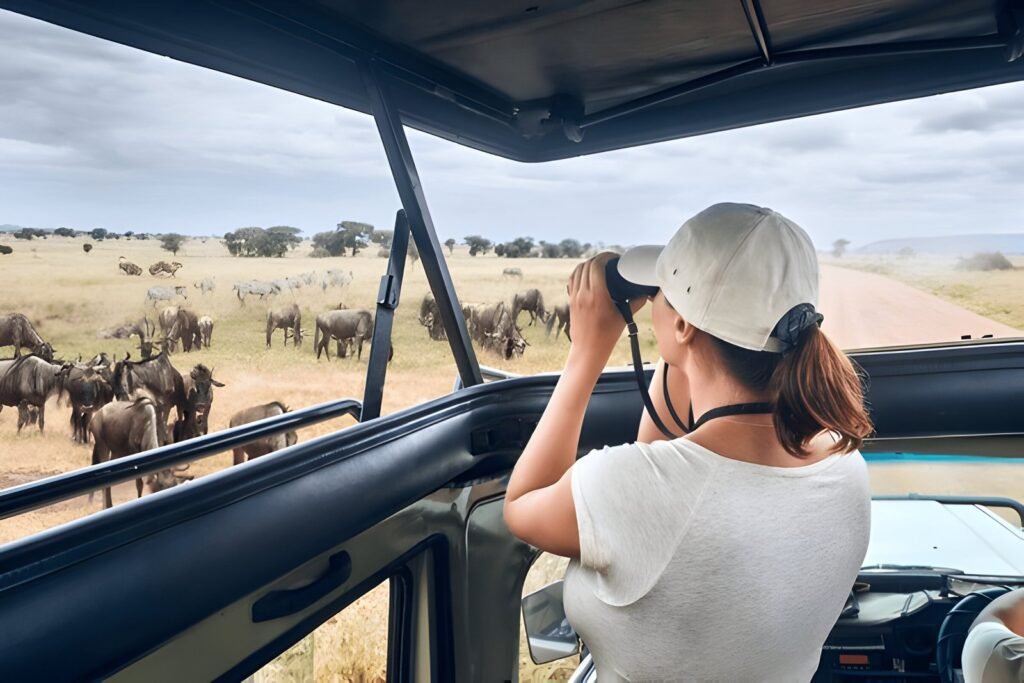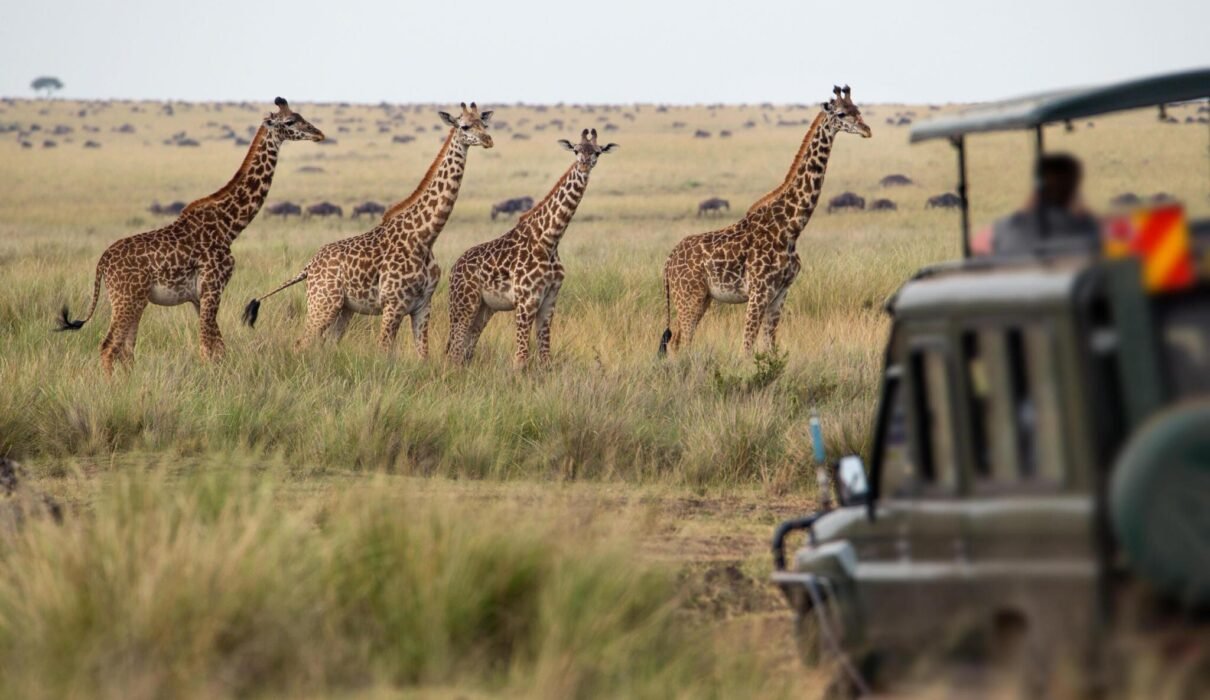Going on a safari is an exciting way to witness Africa’s diverse wildlife up close, but maintaining proper vehicle etiquette is essential for a smooth, safe, and enjoyable experience. Respecting both the animals and fellow safari-goers ensures a more immersive adventure in the wild. This guide will offer essential tips on vehicle etiquette on safari, helping you to get the most out of your trip while protecting the natural environment.

1. Stay Quiet and Respect the Wildlife
One of the most important rules of vehicle etiquette on safari is maintaining a quiet environment when near wildlife. Loud noises can disturb animals, causing them to retreat or behave unpredictably, which can ruin the sighting for everyone.
Key Tips:
- Keep voices low: Speak softly to avoid scaring off the animals.
- Avoid sudden movements: Wildlife can be startled by quick movements inside the vehicle.
- Use cameras quietly: Ensure that your camera settings are silent to avoid startling nearby animals.
Learn more about wildlife safety on safari.
2. Follow Your Guide’s Instructions
Safari guides are experts in the behavior of wild animals and the proper protocols for navigating the bush. Always listen carefully to your guide and follow their instructions closely, whether it’s about staying seated or remaining quiet.
Why This is Important:
- Safety: Guides understand animal behavior and know how to avoid potentially dangerous situations.
- Respect for wildlife: Following instructions ensures you won’t disrupt animals in their natural habitat.
Find out more about the importance of listening to your safari guide.
3. Stay Seated While the Vehicle is in Motion
It’s important to remain seated at all times when the safari vehicle is moving. Standing or moving around the vehicle can cause it to become unsteady, or worse, provoke wild animals nearby.
Key Points to Remember:
- Remain seated: This keeps the vehicle balanced and prevents any sudden jerks that might disturb the animals or the drive.
- Stay within the vehicle: Do not hang out of the windows or stand up, as this may alarm animals and even cause danger.
Read more about safety tips for staying seated on safari.
4. Minimize the Use of Technology
While documenting your safari through photos and videos is exciting, it’s essential to limit the use of technology to ensure you remain fully immersed in the experience and don’t disturb the wildlife or other passengers.
Best Practices for Technology:
- Turn off the flash: Flash photography can scare animals, causing them to flee or become aggressive.
- Silent mode: Set your phone and camera to silent to avoid distracting noises.
- Limit screen time: Focus on the safari experience rather than spending too much time on gadgets.
Learn about photography tips on safari.
5. Share the Best Viewing Spots
On a safari, everyone wants the best view of the animals. Be considerate of your fellow travelers by taking turns at prime viewing spots and allowing others to capture photos or enjoy the sights.
Tips for Sharing the View:
- Rotate seats: If your safari group moves around the vehicle, be willing to switch seats to give others a chance at different views.
- Take turns with photos: Don’t hog the best spots for photography. Let others have their moment to capture memories too.
- Be patient: Sometimes, the view may be blocked temporarily. Trust that the guide will reposition the vehicle for everyone to see.
Discover more about safari photography etiquette.
6. Respect Other Vehicles and Safari-Goers
When you’re on a safari, you’re likely to encounter other vehicles, especially in popular parks. It’s crucial to respect their space and viewing experience, ensuring that everyone can enjoy the wildlife without interference.
How to Be Considerate:
- Don’t crowd other vehicles: Keep a respectful distance to avoid blocking their view or disturbing the animals.
- Limit vehicle noise: Avoid honking or revving the engine when near other safari vehicles or animals.
- Give way: If another vehicle has positioned itself for a view, wait your turn rather than pushing ahead.
Learn more about vehicle etiquette on safari drives.
7. Avoid Littering
Preserving the natural environment is a responsibility that every safari-goer must uphold. Littering is not only harmful to wildlife but also spoils the pristine beauty of national parks and reserves. Always dispose of waste properly.
Best Practices:
- Keep trash in the vehicle: Store all waste in your vehicle until you return to the lodge, where proper disposal is available.
- Avoid single-use plastics: Opt for reusable bottles and containers to minimize waste during your safari.
- Be mindful of biodegradable waste: Even biodegradable items like food scraps can disrupt the ecosystem, so pack everything out.
Discover more about sustainable travel on safari.
8. Be Patient and Flexible
Patience is key on safari. Wildlife sightings aren’t guaranteed, and you may spend time waiting for animals to appear or move into view. Trust your guide’s expertise, and remain calm even if you don’t see the animals you hoped for right away.
What to Keep in Mind:
- Patience leads to rewards: The best sightings often require patience, as animals may take time to come out into the open.
- Flexibility is important: Wildlife is unpredictable, and plans may change as animals move. Be open to whatever the day brings.
- Stay positive: Enjoy the entire safari experience, from the scenery to the smaller creatures, even when big cats or elephants aren’t in sight.
Read more about patience and flexibility during safaris.
9. Avoid Eating During Game Drives
While it may be tempting to snack during a long game drive, it’s best to avoid eating in the vehicle, as the smells can attract animals or disturb the natural environment. Many safaris include designated meal stops where you can enjoy food safely.
Reasons to Avoid Eating:
- Smells attract animals: The scent of food can attract animals to the vehicle, creating potentially dangerous situations.
- Distraction-free: Eating can distract you from the wildlife sightings and the overall safari experience.
- Scheduled stops: Most guides plan breaks at safe locations where you can eat and stretch your legs.
Discover more tips for safari meal breaks.
10. Plan Your Safari with Experienced Operators
Planning a successful safari involves choosing experienced and knowledgeable operators who understand wildlife behavior and safety protocols. Eddy Tours & Safaris offers expertly guided safaris that ensure a safe, enjoyable experience with a focus on vehicle etiquette. Whether you’re exploring Tanzania’s Serengeti or Ngorongoro Crater, Eddy Tours provides personalized service and expert guides to enhance your adventure.
For those also interested in climbing Mount Kilimanjaro, Kilimanjaro Climb Specialist offers tailored packages that combine safari adventures with an exhilarating trek to Africa’s highest peak.
Start planning your safari with local experts.
Conclusion: Enjoy a Safe and Respectful Safari
Observing vehicle etiquette on safari ensures a smooth, enjoyable experience for both you and your fellow travelers, while protecting the environment and wildlife. By following these simple tips, you’ll not only have a memorable adventure but also contribute to the preservation of the delicate ecosystems you’re there to witness.
For personalized safari packages and expert guidance, visit Eddy Tours & Safaris. If you’re interested in combining your safari with a Mount Kilimanjaro climb, check out Kilimanjaro Climb Specialist for tailored adventure packages.

